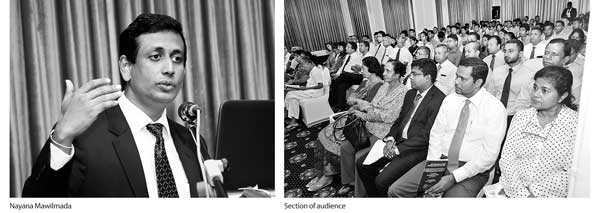08 Aug 2016 - {{hitsCtrl.values.hits}}

By Lahiru Pothmulla
Middle-class families have been forced to move towards the urban fringe from the core cities owing to a number of factors resulting in heavy city traffic congestion and the members of these families themselves are the primary victims of this nuisance, urban development specialist Nayana Mawilmada said.
Mawilmada, Head of Investments of Western Region Megapolis Planning Project, expressed these views while delivering John Diandas Memorial Lecture 2016 held last week in Colombo under the theme ‘Unlocking the nexus between transport and land use’.
In his speech, he said Sri Lankans have limited access to mortgage finance and having difficulties when accessing to a house loan unlike in other countries.
“Access to mortgage is extremely limited here. Mortgage exposure to the banks in Sri Lanka is somewhere around 8 percent from their overall portfolio. But it is over 50 percent in India and 75 percent in the UK. Basically, our banks don’t give us money unless you can really show them that you don’t need the money,” he said.
Low density housing
Commenting on the issues of low density of housing, he said Sri Lankans prefer predominantly single family detached houses based on cultural aspects as well as economic aspects. Mawilmada said modern apartments, an option for single houses, are either extremely expensive for many or the units available in the market are terrible in condition.
“Therefore, average people tend to secure funds to purchase land outside Colombo where the prices are affordable and start building up houses. First, they construct a room and then they add a kitchen and then a garage. The extremely wealthy could afford to settle in the centre of Colombo while the rest move to affordable housing options outside Colombo. We can’t continue in this manner, we need to manage it,” he said.
When it comes to housing finance market, he said there was a VAT break for large-scale housing projects which came under Rs.10 million and this has limited investors from coming up with projects valued more than Rs.10 million.
Fragmented land holdings
Mawilmada said fragmented lands and land sale industry is one of the main reasons for heavy traffic congestion. “Most of the land plots up for sale have one entry/exit point despite the fact that there are so many people inside,”
he said.
Though all of our settlements had spread around, no economic and social infrastructure facilities had been scattered along with it be it Colombo, Kandy or Galle. Therefore, he said, people still have to come to the core city for education, job and hospital creating traffic congestion. “If we are really to sustain, we need to spread commercial and social facilities as well,” he said.
Underutilized lands
Commenting on the state lands, which are underutilized, he said there are plenty of such lands in Colombo and there is a huge potential waiting to be unleashed in these lands.
“Colombo Fort, one of the most chaotic places in the Capital, has lots of state lands. If and when we could implement the multi-model terminal consolidating the Fort Railway Station and the Central Bus Terminal, we can get 50 acres freed in the heart of the city. Similarly, we have 38 acres in Welikada. There are private lands too and when lucrative market forces are in place, those too will get unlocked,” he said. He said market interventions are essential to make sure that the private-owned lands are on the market and there was no need to bulldoze them which is a common practice in countries like Singapore. “We can have a lighter approach and come up with an incentive structure which encourages the sale of ancestral homes people are no longer live in.
Short-term and elections-based solutions
Mawilmada said underline reasons for the pattern of heavy traffic congestion, high density, improper planning and other issues were extremely complex social and economic causes. He said, at the core, it’s been a failure of the successive governments to come up with long-term sustainable projects.
“We are stuck in short-term loops, stuck in election circle. We didn’t have leaders who are looking at things in long term enough to really get ahead with this evolution of events. Growing cities is a long-term investment, a generations of investments. We need to have a sound leadership and specialists who look at from the same level over these trends. We need to coordinate, get along, synchronize and concentration on what we are doing for social infrastructure has been an obstacle and enforcement is extremely difficult because of political social reasons,” he said.
Pushing Sri Lankans towards public transportation, upgrading public transport especially that of the railway, integrated transport hubs and use of underutilized lands could unlock the nexus between transport and land use, Mawilmada said.
Pix by Indraratna Balasuriya
29 Nov 2024 46 minute ago
29 Nov 2024 1 hours ago
29 Nov 2024 2 hours ago
29 Nov 2024 3 hours ago
29 Nov 2024 3 hours ago